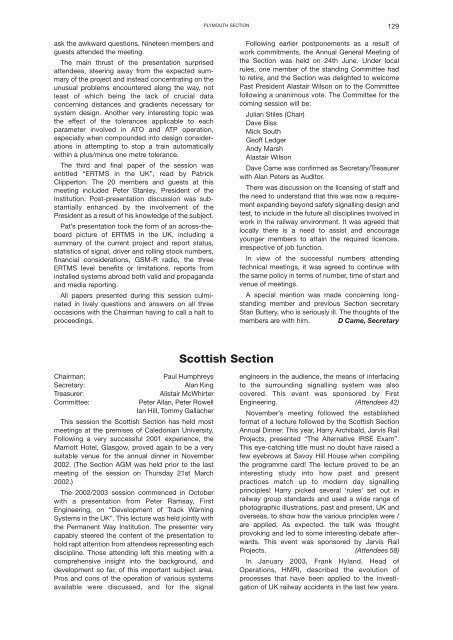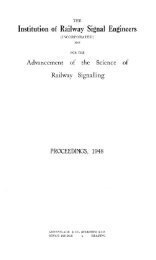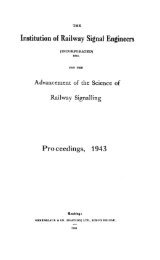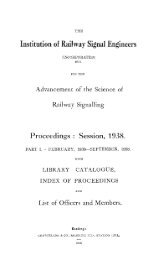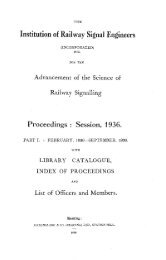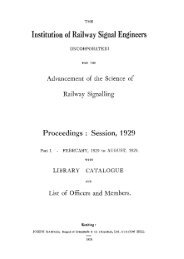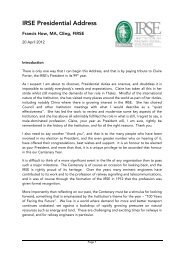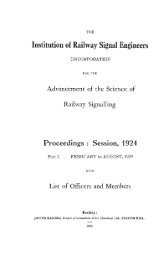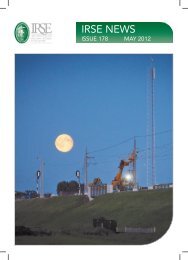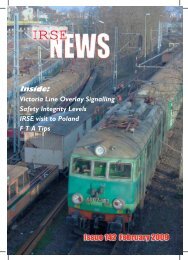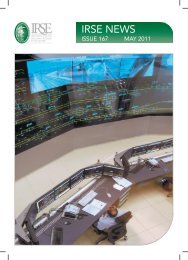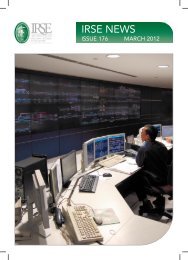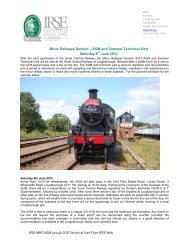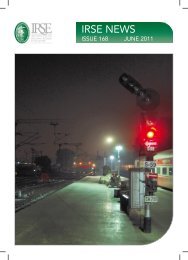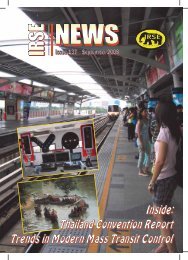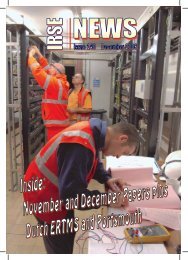Proceedings 2002/2003 - IRSE
Proceedings 2002/2003 - IRSE
Proceedings 2002/2003 - IRSE
You also want an ePaper? Increase the reach of your titles
YUMPU automatically turns print PDFs into web optimized ePapers that Google loves.
PLYMOUTH SECTION<br />
129<br />
ask the awkward questions. Nineteen members and<br />
guests attended the meeting.<br />
The main thrust of the presentation surprised<br />
attendees, steering away from the expected summary<br />
of the project and instead concentrating on the<br />
unusual problems encountered along the way, not<br />
least of which being the lack of crucial data<br />
concerning distances and gradients necessary for<br />
system design. Another very interesting topic was<br />
the effect of the tolerances applicable to each<br />
parameter involved in ATO and ATP operation,<br />
especially when compounded into design considerations<br />
in attempting to stop a train automatically<br />
within a plus/minus one metre tolerance.<br />
The third and final paper of the session was<br />
entitled “ERTMS in the UK”, read by Patrick<br />
Clipperton. The 20 members and guests at this<br />
meeting included Peter Stanley, President of the<br />
Institution. Post-presentation discussion was substantially<br />
enhanced by the involvement of the<br />
President as a result of his knowledge of the subject.<br />
Pat’s presentation took the form of an across-theboard<br />
picture of ERTMS in the UK, including a<br />
summary of the current project and report status,<br />
statistics of signal, driver and rolling stock numbers,<br />
financial considerations, GSM-R radio, the three<br />
ERTMS level benefits or limitations, reports from<br />
installed systems abroad both valid and propaganda<br />
and media reporting.<br />
All papers presented during this session culminated<br />
in lively questions and answers on all three<br />
occasions with the Chairman having to call a halt to<br />
proceedings.<br />
Following earlier postponements as a result of<br />
work commitments, the Annual General Meeting of<br />
the Section was held on 24th June. Under local<br />
rules, one member of the standing Committee had<br />
to retire, and the Section was delighted to welcome<br />
Past President Alastair Wilson on to the Committee<br />
following a unanimous vote. The Committee for the<br />
coming session will be:<br />
Julian Stiles (Chair)<br />
Dave Biss<br />
Mick South<br />
Geoff Ledger<br />
Andy Marsh<br />
Alastair Wilson<br />
Dave Came was confirmed as Secretary/Treasurer<br />
with Alan Peters as Auditor.<br />
There was discussion on the licensing of staff and<br />
the need to understand that this was now a requirement<br />
expanding beyond safety signalling design and<br />
test, to include in the future all disciplines involved in<br />
work in the railway environment. It was agreed that<br />
locally there is a need to assist and encourage<br />
younger members to attain the required licences,<br />
irrespective of job function.<br />
In view of the successful numbers attending<br />
technical meetings, it was agreed to continue with<br />
the same policy in terms of number, time of start and<br />
venue of meetings.<br />
A special mention was made concerning longstanding<br />
member and previous Section secretary<br />
Stan Buttery, who is seriously ill. The thoughts of the<br />
members are with him. D Came, Secretary<br />
Scottish Section<br />
Chairman:<br />
Secretary:<br />
Treasurer:<br />
Committee:<br />
Paul Humphreys<br />
Alan King<br />
Alistair McWhirter<br />
Peter Allan, Peter Rowell<br />
Ian Hill, Tommy Gallacher<br />
This session the Scottish Section has held most<br />
meetings at the premises of Caledonian University.<br />
Following a very successful 2001 experience, the<br />
Marriott Hotel, Glasgow, proved again to be a very<br />
suitable venue for the annual dinner in November<br />
<strong>2002</strong>. (The Section AGM was held prior to the last<br />
meeting of the session on Thursday 21st March<br />
<strong>2002</strong>.)<br />
The <strong>2002</strong>/<strong>2003</strong> session commenced in October<br />
with a presentation from Peter Ramsay, First<br />
Engineering, on “Development of Track Warning<br />
Systems in the UK”. This lecture was held jointly with<br />
the Permanent Way Institution. The presenter very<br />
capably steered the content of the presentation to<br />
hold rapt attention from attendees representing each<br />
discipline. Those attending left this meeting with a<br />
comprehensive insight into the background, and<br />
development so far, of this important subject area.<br />
Pros and cons of the operation of various systems<br />
available were discussed, and for the signal<br />
engineers in the audience, the means of interfacing<br />
to the surrounding signalling system was also<br />
covered. This event was sponsored by First<br />
Engineering. (Attendees 42)<br />
November’s meeting followed the established<br />
format of a lecture followed by the Scottish Section<br />
Annual Dinner. This year, Harry Archibald, Jarvis Rail<br />
Projects, presented “The Alternative <strong>IRSE</strong> Exam”.<br />
This eye-catching title must no doubt have raised a<br />
few eyebrows at Savoy Hill House when compiling<br />
the programme card! The lecture proved to be an<br />
interesting study into how past and present<br />
practices match up to modern day signalling<br />
principles! Harry picked several ‘rules’ set out in<br />
railway group standards and used a wide range of<br />
photographic illustrations, past and present, UK and<br />
overseas, to show how the various principles were /<br />
are applied. As expected. the talk was thought<br />
provoking and led to some interesting debate afterwards.<br />
This event was sponsored by Jarvis Rail<br />
Projects. (Attendees 58)<br />
In January <strong>2003</strong>, Frank Hyland, Head of<br />
Operations, HMRI, described the evolution of<br />
processes that have been applied to the investigation<br />
of UK railway accidents in the last few years.


